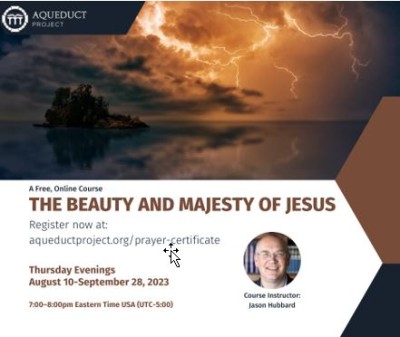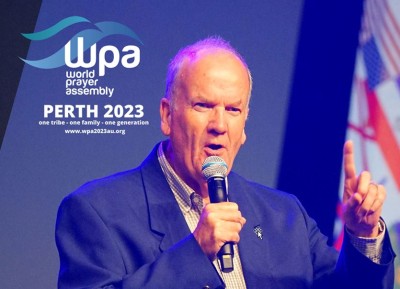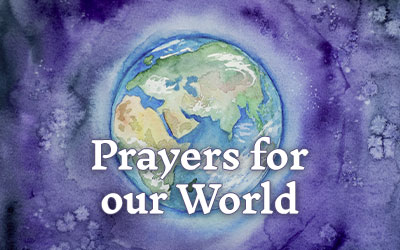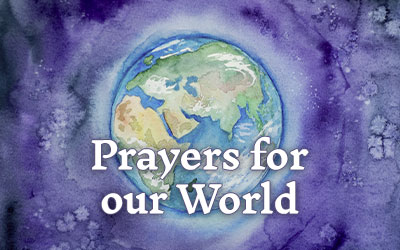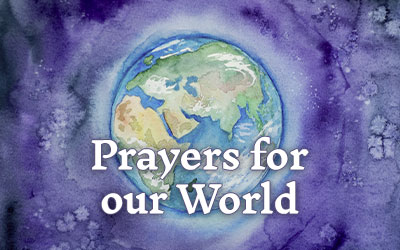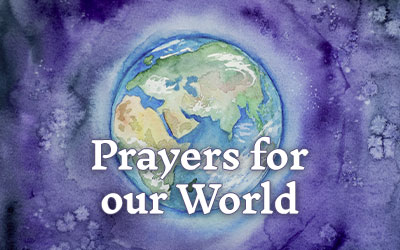Beauty and Majesty of Jesus Course - Replays
06 Nov 2023The Beauty and Majesty of Jesus was a free 8-week online course led by Dr Jason Hubbard and facilitated by Melody Divine.
The course has finished, but we are pleased to be able to offer you the opportunity to watch the replays!
During this course we explored the depths of the beauty and majesty of Jesus as the Creator, the Lamb of Glory, the Glorious Bridegroom, the Good Shepherd, and the King of the Nations!
We look at the attributes and characteristics of Jesus described in the book of Revelation in the setting around the throne, the Beauty Realm of God!
You will come away with greater insight and revelation of the glorious person and power of Jesus - how to connect with him in prayer and learn Who He wants to be to you!
By God’s grace you will both fall more in love with him and stand in greater awe and reverence of Him!
Watch the Course Recordings by clicking the links below:
Session 1 | Session 2 | Session 3 | Session 4
Session 5 | Sessions 6 | Session 7 | Session 8
“My name will be great among the nations, from where the sun rises to where it sets…“ Says the Lord Almighty (NIV) Mal 1:11
We are pleased to bring you this November 2023 edition of IPC Connections!
I trust that you will be blessed and encouraged as you read the articles, news and resources info this month!
WPA 2023 AU – More than 3,000 believers gathered in Perth, Australia last month for the World Prayer Assembly (WPA) – with an estimated 1.5 million watching and praying online. It was a truly momentous, God-filled, prayer saturated occasion!
May I extend the greatest thanks and appreciation on behalf of the worldwide IPC family, to James Condon, Margaret Court, Michael Greaves, Wendy Yapp, and the huge team that made this event such a resounding success! Grateful thanks also go to the Australian and Indonesian sponsors for their generosity. Appreciation also to Dean Briggs, Daniel Pandji and the 10 IPC regional leaders for their participation.
See James and Margaret’s messages in the Editorial that follows below.
The plenary session WPA video replays are available //www.youtube.com/@worldprayerassembly/streams">HERE | Photos | See Pat Steele’s Reels
12:11 Prayer - During WPA,//www.youtube.com/@SuccatHallelHouseOfPrayer/streams"> Rick Ridings who leads a 24/7 House of Prayer and Praise, encouraged us to be in prayer for Israel and the Middle East. As WPA closed, we heard of the invasion and atrocities that sparked war between Israel and Hamas. We mobilised concerted 12:11 Prayer for 21 days, with many people pausing to pray in unity for Israel at 12 Noon, for 11 Minutes each day. We have decided to keep going with this 12:11 Prayer until peace returns. Let's continue to pray for the harvest that many Jews, Arabs, and Internationals will come to Christ, pray for protection over the believers and house churches in Gaza, and pray for the peace of Jerusalem that God will restrain and contain this war... do join us as the Lord leads you!
2BC – 2 Billion Children – is a campaign conceived by IPC’s Senior Advisor and Exec Member, Tom Victor, with a vision to see the 2 billion children across our world empowered to share the message of God’s love with their friends and families. Tom has teamed up with Ann Low and Anja Letsatsi, who are raising awareness for this exciting project. Read more Here.
Beauty and Majesty of Jesus – is an 8-session course that I had the privilege of presenting recently on the Aqueduct Platform. More than 350 people joined us online as we explored the depths of the beauty and majesty of Jesus as the Creator, the Lamb of Glory, the Glorious Bridegroom, the Good Shepherd, and the King of the Nations! We are pleased to make the course freely available to you in the resources section below! Here is session 1!
18 Days of Prayer for the Hindu World - These next 2 weeks, we invite you to join us as we pray for the unreached peoples in cities across the Hindu world, in and around India. See the online and downloadable Adult and Children’s prayer guides.
 Global Day of Prayer for the Hindu World – Sun 12th November marks the fourth of our Global Days of Prayer in 2023. We invite you to join with millions of believers worldwide, at home, face to face or online as we ask the Lord of the Harvest to send forth laborers to every unreached people group in these cities and nations! Do join us online for an hour (or more) of this 24 hours, to pray for Gospel movements throughout the Hindu world and Asia!
Global Day of Prayer for the Hindu World – Sun 12th November marks the fourth of our Global Days of Prayer in 2023. We invite you to join with millions of believers worldwide, at home, face to face or online as we ask the Lord of the Harvest to send forth laborers to every unreached people group in these cities and nations! Do join us online for an hour (or more) of this 24 hours, to pray for Gospel movements throughout the Hindu world and Asia!
Join all-age prayers for the Hindu World from 8am EST 12 November on Zoom:
CLICK LINK - Zoom Meeting ID – 84602907844 Passcode 32223
Editorial – The editorial article in this edition is entitled ‘Mountain Movers’ – Praying for the Hindu World in Jesus’ Name! – and is about the key to effective and powerful prayer – praying in the Name of Jesus! I trust it will embolden and encourage you in your prayers.
$1 a month! - IPC Connections is brought to 16,000+ Individuals, groups, churches, ministries and networks, free of charge. As an organization, we are dependent on personal donations, legacies and occasional grant support for our income. A gift of even $1 a month would make a real difference to IPC!
If you would like to sow into the IPC Vision, please click here. Thank you for your support!
 Thank you for continuing to partner with us in mobilising and informing united prayer across nations, denominations, movements, and generations for the fulfilment of the Great Commission.
Thank you for continuing to partner with us in mobilising and informing united prayer across nations, denominations, movements, and generations for the fulfilment of the Great Commission.
All Glory to the Lamb,
Jason Hubbard - Director
International Prayer Connect
‘Mountain Movers’ - Praying for the Hindu World in the Jesus’ name!
As we prepare our hearts to pray for the Hindu world on November 12th, I want to encourage us to pray in the authority of the Name of Jesus!
Praying “in Jesus’ name” is a reality that changes why, how, and what we pray, from the very opening moment of our communion with God! According to Jesus, one of the keys to answered prayer is praying ‘in his name.’
John 14:13-14, “Whatever you ask in my name, this I will do, that the Father may be glorified in the Son. If you ask me anything in my name, I will do it.”
Jesus first challenges us to Ask him, then shares with us the Right way to ask him- – in his name! This is followed by an Assurance of our asking in His name that he will do it!
So what does Jesus mean when he says, “ask in his name?” I see three primary things.
First: it is worship-based prayer focused on the character and renown of Christ.
Second: we come on the basis of Christ’s merit.
Third: we are authorized to be Christ’s representatives praying with his delegated authority!
Worship-based Prayer
Ultimately God will answer prayer when it will magnify his name and his character!
Praying ‘in Jesus’ name’ means we pray that the reputation of Jesus would be enhanced throughout the Hindu world. Jesus Christ would be more clearly seen and savored, revealed and revered.
We pray that the name of Jesus would be treated as infinitely valuable in key cities throughout India as it is in heaven!
One major assumption when we pray is this:
There’s always MORE --OF Christ, FROM Christ, and FOR Christ!
The one major GUARANTEE our prayers will be heard and answered is this: Will the answers to our prayers help...
EXALT Jesus’ NAME? (1 Phil 2: 9-11)
SPREAD Jesus’ FAME? (Matt 28: 19-20)
EXTEND Jesus’ REIGN? (Rev 11:15)
INCREASE Jesus’ GAIN? (Isaiah 9:7)
RATIFY Jesus’ CLAIM? (John 14:6)
Christ’s Merit - Rom 3:24
Praying in the name of Jesus is no formality. We approach God in prayer through Jesus because Jesus is the grounds upon which God chooses to hear us.
God chooses to hear us because we have loved Jesus and believed that God sent him. God answers those who ask of him on the basis of Jesus and his Gospel work.
You and I have no claim on God, but Christ does. He merited the blessing of the Father’s favor by his perfect life of obedience and sacrifice of the cross. Our access depends solely on what Jesus has done!
When we pray in Jesus’ name we are asking the Father, ‘grant this request, because your Son the Lord Jesus has earned it!’ May Jesus see the travail of His soul and be satisfied!
May the Lamb who was slain receive his due reward. He is All-Deserving! Rev. 5:12
In our praying, it is God’s name that is at stake! Jesus is telling us that His Father always acts in ways that honor His Name! So we pray, God vindicate your name in the nations of the earth!
Praying in his name means praying in accordance with his will! 1 John 5:14–15 (NKJV), “Now this is the confidence that we have in Him, that if we ask anything according to His will, He hears us. 15 And if we know that He hears us, whatever we ask, we know that we have the petitions that we have asked of Him”
We come asking in accord with Christ’s will, and desires. As we plead the promises of God over the Hindu world, we are praying from the answer with the answer in mind! We are able to ask what he would ask because our wills are in sync with his will.
John 16:24 (NKJV), “Until now you have asked nothing in My name. Ask, and you will receive, that your joy may be full.”
The Father so loves the Son that when we introduce the Son’s name in prayer, we have his ear, we have secured his willingness, and we have touched his heart!
Authorized as ‘Christ’s representatives’
So, when we are praying in ‘Jesus’ name’ we are coming as those who are authorized to act in his place. Since we ‘represent’ him, Jesus authorized us to use his name in prayer. He gave us authority over his accounts. He asked us to exercise control over his estate - the kingdom of God! To pray in Jesus’s name and with his authority ultimately means praying according to his will and not our own.
 Use this PrayerCast Video to pray for India
Use this PrayerCast Video to pray for India
We exercise our authority through prayer. By prayer we ask the Father for all we need to get the job done.
By Prayer - we ask God to release his power. “Father release your supernatural power, resources, and gifts to see the Gospel advanced among the unreached of India. Strengthen the persecuted believers to stand strong, proclaim your Word with boldness and stretch forth your hand to perform signs and wonders through your servants in the name of your glorious Son the Lord Jesus” Acts 4:29-30
By Prayer - we ask God to bind and destroy all demonic strongholds throughout India and the Hindu world that are contrary to his will! “Father remove the blindness that the enemy has placed over the minds of the unbelievers throughout the Hindu world, in Jesus Name” 2 Cor. 4:4-6, Acts 26:18
By Prayer - we ask for justice, making wrong things right. “Father come to the rescue of women and children who are being trafficked, sold into child labor, abandoned on the streets, and train stations, in Jesus’ Name” Psalm 82:3-4
By Prayer - we ask God to shatter evil regimes and expose corruption – “Father may you raise up leadership in India in these coming national elections in 2024 who fear you Lord of Hosts, defend righteousness, restrain lawlessness and create an environment most receptive for the advance of the Gospel!” 1 Tim. 2:1-4
By Prayer - we ask him to direct his grace and power for the advance of the Gospel in the nations of India and the Hindu world. “Father may you send forth laborers to every people in every place throughout India that is still in need of a Gospel witness!” Matthew 9:36-39
Jesus is King of Kings and Lord of Lords! He has been given the name that is above every other name! He is the Sovereign Son of the Father, who reigns at the right hand of the Father … All authority in heaven and earth has been given to him and he has asked us to exercise his delegated authority in the place of prayer! He is the triumphant victor over every foe-sin, death, Hades and the devil. He is the glorious Conqueror!
Therefore, we are praying from the victory that he has secured through the cross. He is the Righteous Judge of peoples and nations, to whom all must give an account.
He is the Undeniable and Gracious Ruler of history, overseeing its path and its outcome from beginning to end! He is the Incomparable King of a Kingdom that will ultimately cover the earth as the waters cover the sea! Hab. 2:14
‘Hail the Name, Jesus’ Name - Watch this Worship Video: Youtube | iTunes
 Expect Results!
Expect Results!
What happens when we pray in Jesus’ name? What is the ultimate purpose and result?
According to Jesus’ multiple commands in this Upper Room Discourse, the outcomes of praying in His name are:
- The Father will be glorified in the Son!
- We bear fruit that remains!
- Our joy is full!
- God’s will is done on earth as it is in heaven!
He promised if we prayed in his name, he would do it! Let’s believe it and pray until we see the results!
Let’s believe for some mountains to be moved and shifts in the heavenlies during this season of prayer for the Hindu world!
What a glorious privilege to pray “In Jesus Name!”
AMEN … So it is …
Dr. Jason Hubbard – Director
International Prayer Connect
“Firstly, Thank You All for attending and participating in the World Prayer Assembly of 2023! What an amazing and blessed time we had!
We've heard so many amazing testimonies of how our Lord has touched the hearts and minds of so many who attended, for which we are very humble and thankful. Below is a personal message from our Chairman James Condon to you.
As I embarked on my morning worship, the lyrics of the song "Goodness of God" have been a source of inspiration for my reflections:
"I love you Lord, for your mercy never fails me.
From the moment that I wake up until I lay my head,
I will sing of the goodness of God."
Reflecting on our time together at WPA Perth 2023, it's undeniable how profoundly good God has been to us. All glory and praise are due to Him. God's blessings exceeded even my wildest expectations. He did far more than I ever imagined as Ephesians 3:20 says: “Now all glory God, who is able, through His mighty power at work within us, to accomplish infinitely more that we ask might ask or think.” Your presence at WPA 2023 was instrumental in making it a memorable and transformative experience.
I'm deeply touched by the many emails, phone calls, and texts expressing gratitude for the amazing time we shared. The memories will live on for the rest of my life. It's heartening to know that our event was witnessed by so many people, not only across Australia but also around the world. Only God truly comprehends the profound impact and the fruits of our time together.
Following the conclusion of the event, we awoke to the disheartening news of the events in Israel on Saturday morning, October 7th. Subsequently, I've been participating in online prayer meetings with Australia Prays, where we've had a dear brother from Bethlehem providing us with first-hand reports. I humbly request that you join us in keeping the prayer for "The Peace of Jerusalem" fervent in your hearts.
Throughout these uncertain times, Psalm 125 has offered guidance and solace. How intriguing that Rick Ridings urged us to pray for restraint regarding a potential World War Three. Let's continue to believe and pray, remembering that God reigns sovereign over all.
As we move forward, I welcome any suggestions or ideas you may have. The Wave of Glory is undoubtedly on its way, and your input is invaluable.
Thank you once again for your participation and your unwavering faith. May our journey be marked by continued blessings and inspired action.
In His Grace,
James Condon
Chairman - WPA Australia 2023

Personal Message from Ps Margaret Court:
"I want to say a big ‘Thank You’ to all the Pastors, Leaders and everyone who helped with the World Prayer Assembly.
What a wonderful team of people that made it an unforgettable gathering to release a great break-through in our city and Nations.
“The door is open”! we carry His Glory within and upon our lives. (Hebrews 2:7 “You have crowned him with glory and honour and set him over the works of Your hands”)
I believe it is the start of a great move of God as we stay in unity and prayer.
As we pray also for Israel and the world, with such turbulence happening in many Nations of the world, perhaps it is a time for us to keep coming together in prayer for our Nation and the Nations.
Something for all of us to pray about, as corporate prayer is so powerful.
We have built a unity in this city which I appreciate and am so thankful to be a part of what God is doing. Psalm 133:1 “Behold, how good and how pleasant it is for brethren to dwell together in unity!
Thank you to Ps Michael and his team that pulled it together. Ps Ned and the worship team, Wendy and the ‘Breakouts’, Media, hospitality, youth, children workers and many more. To anyone who gave their time to be available, I ‘Thank You’.
Much blessing and favour upon each of your lives, your family and churches.
I have enjoyed serving with you."
Much blessing,
Margaret Court
Vice Chair, WPA
The plenary session WPA video replays are available HERE | Photos | See Pat Steele’s Reels
Hamas Vows to 'Repeat Oct 7 Attacks' as Blinken Lands in Israel and IDF Surrounds Gaza City
JERUSALEM, Israel – Nearly one week after Israel's Gaza ground campaign began, Israeli forces have encircled Gaza City. The next phase of the fighting could be the most dangerous. Intense fighting continues in and around Gaza City, the Hamas stronghold. The I.D.F. Chief of Staff, Herzi Halevi, said the military is destroying Hamas's terror infrastructure. Hamas's elaborate labyrinth of tunnels is one of the Israeli military's main concerns. Russian television was allowed access into some of the more than 300 miles of tunnels.
President Joe Biden announced that another 74 Americans have been evacuated out of Gaza through the Rafa Crossing into Egypt. The White House also defended the president's idea of a humanitarian pause.
"A temporary pause that's localized that would allow us to get aid in and to get our people out is a good thing for the people of Gaza," National Security Council Spokesman John Kirby explained. "It's a good thing for the Americans that are being held hostage. And it's not going to stop Israel from defending itself because the security assistance we're providing continues to flow. And a temporary pause doesn't mean a general cease-fire where the war is over. It means a pause, only temporary, for a specific purpose."
U.S. Secretary of State Antony Blinken arrived today in Israel and wants to push for that humanitarian "pause" or "pauses" that may also help with the release of hostages.
The Times of Israel reports Prime Minister Benjamin Netanyahu is weighing the idea, but some are concerned this could be a step toward a cease-fire of some sort, or an opportunity for Hamas to strengthen itself.
In an editorial, The Wall Street Journal argued:
"Hamas has two messages for two different audiences. To the international community, it pleads for a cease-fire on humanitarian grounds. To the Arab world, it pledges to repeat its Oct. 7 attacks and sacrifice as many Palestinians as it takes to destroy Israel. That's what a cease-fire means to Hamas: a chance to repeat Oct. 7 another day. The similar idea of a 'humanitarian pause,' gaining steam on the Western left, is, to Hamas, merely an opportunity to reload."
Up north, the I.D.F. is attacking Hezbollah positions in south Lebanon after the terror group continues firing rockets into Israel. CBN's Chuck Holton was on the scene of a rocket strike in Kiryat Shmona.
More: CBN
Pray: for lasting peace in the Israel-Gaza conflict, ease suffering, and guide leaders toward reconciliation. (Matthew 5:9)
Pray: protection for the innocent in Gaza and Israel, grant wisdom to politicians and decision-makers, and lead all to peace. (Psalm 34:18)
Pray: for the captives to be released, for healing and restoration. Let your love prevail. (Isaiah 32:18)
See: CBN’s Prayer for Peace
Students have held hundreds of protests and counterprotests on college campuses since the October 7 Hamas attacks on Israelis and Israel’s airstrikes on Gaza in response.
At Tulane, a fight broke out after someone tried to burn an Israeli flag. At Columbia University, posters of kidnapped Israelis were torn down. At Harvard and Columbia, a so-called “doxxing truck” showed up on campus naming students whose organizations co-authored a statement saying Israel is “entirely responsible” for the deadly October 7 attacks by Hamas and “all unfolding violence.” And at Cornell, classes were canceled Friday after death threats were posted toward Jewish students under the username “hamas soldier” on a Greek life website. A few days after the postings, 21-year-old Cornell student Patrick Dai was arrested and federally charged with making online threats. He has not entered a plea.
Shortly after the October 7 attacks, the National Students for Justice in Palestine released a “toolkit” to help chapters across America organize a day of resistance on college campuses. Their materials called the rampage, a “historic win for Palestinian resistance.” Florida Gov. Ron DeSantis ordered state universities to expunge the student group, accusing its members of illegally backing the Palestinian militants.
Pro-Palestinian and Pro-Israel protests have come head-to-head on some campuses, raising concerns over student safety.
Student-led rallies have exploded from coast to coast. In the west, the University of California at Berkeley issued a statement decrying the “growing prevalence of online threats, doxxing and harassment”. And in the east, emotions were so high at a University of Florida prayer vigil that when a participant reportedly fainted, the crowd screamed and panicked, injuring five in a stampede.
More: CNN | USNEWS | Al-Jazeera | NBC
Pray: that these ongoing protests and demonstrations do not erupt into violence. (Matthew 5:9)
Pray: for restraint and mutual respect among the student populations and for an end to the online hate speech. (Ephesians 4:29)
Pray: for wisdom for the campus staff as they tackle the conflicting political views. (James 3:17)
In a recent press conference, Ukrainian President Volodymyr Zelenskyy denied that the conflict between Ukraine and Russia had reached a "stalemate." He emphasized that despite the front line between the two sides remaining largely unchanged for almost a year, he does not view it as a stalemate. Zelenskyy also rejected the idea that Western countries were pressuring Ukraine to engage in negotiations with Russia, stating that there is no pressure from EU leaders or the US to hold talks with Russia and make concessions.
Zelensky expressed irritation at media reports suggesting pressure to negotiate and emphasized that he would always act in accordance with the will of the Ukrainian people. He also mentioned that the ongoing conflict between Israel and Hamas had diverted international attention away from Ukraine, suggesting that this may be a goal for Russia.
Despite the protracted nature of the war, Ukraine's allies, including the United States, have maintained their readiness to provide military and financial support to Kyiv for as long as necessary to resist Russia's aggression.
The total number of Ukrainian and Russian troops killed or wounded since the war in Ukraine began 18 months ago is nearing 500,000, U.S. officials said. Russia’s military casualties, the officials said, are approaching 300,000. The number includes as many as 120,000 deaths and 170,000 to 180,000 injured troops. The Russian numbers dwarf the Ukrainian figures, which the officials put at close to 70,000 killed and 100,000 to 120,000 wounded.
More: Al Jazeera | NY Times
Pray: for wisdom and strength for President Zelenskyy and continued support from world leaders. Let justice flow. (Micah 6:8)
Pray: protection and healing for the innocent in the midst of conflict, bring hope, and end suffering. (Psalm 46:1)
Pray: for peace in Ukraine, for healing and reconciliation. May your love prevail. (Matthew 5:9)
Since the US withdrawal from Afghanistan in 2021, religious and civil liberties have rapidly deteriorated under Taliban rule. Former government officials, civil servants, and religious minorities, such as Christians, endure intense governmental and societal pressure. They face regular Taliban raids on their homes, threats against their jobs and families, and limited access to education.
The Taliban aims to sever contact between Afghani citizens and Western groups and has virtually eradicated on-the-ground relief efforts by NGOs, suspecting spies among their workers. Despite the dire situation, the state of religious freedom and Christian tolerance has not improved since Afghanistan was listed as one of the worst places for Christians in the 2022 Persecutor of the Year report. The Taliban seeks to erase Christianity and other religious minorities, even denying the existence of Christians in Afghanistan.
Increasing poverty and starvation rates pose a higher security threat as the Taliban offers financial rewards for reporting Christians. Captured Christians face brutal torture or death unless ransomed, often bankrupting their families. Many Christians escape to Pakistan, risking capture or death by the Taliban. Those who make it to Pakistan must hide their faith, while some even return to Afghanistan, deeming it safer under the Taliban.
The West's response to the regime remains ambivalent, employing economic sanctions that devastate Afghanistan's economy. While no government officially recognizes the Taliban, 30 countries engage in diplomatic talks. Despite these challenges, the gospel continues to reach Afghani hearts, with believers bravely preaching in remote regions.
Despite the Taliban's efforts, the light of the Gospel perseveres in Afghanistan, with secret prayer meetings, teaching sessions, and courageous evangelism amidst adversity.
More: Persecution.org | Operation World
Pray: protection for those persecuted in Afghanistan, grant them strength, and let Your light shine in darkness. (Matthew 5:10)
Pray: divine hope and freedom to those oppressed under the Taliban. May Your love conquer fear. (2 Timothy 1:7)
Pray: empower Afghani believers to share Your message despite adversity. Let faith overcome challenges. (Romans 8:37)
Pray: for the church-planting movement who are working to resource the church in oppressed nations. (Isaiah 41:10)
